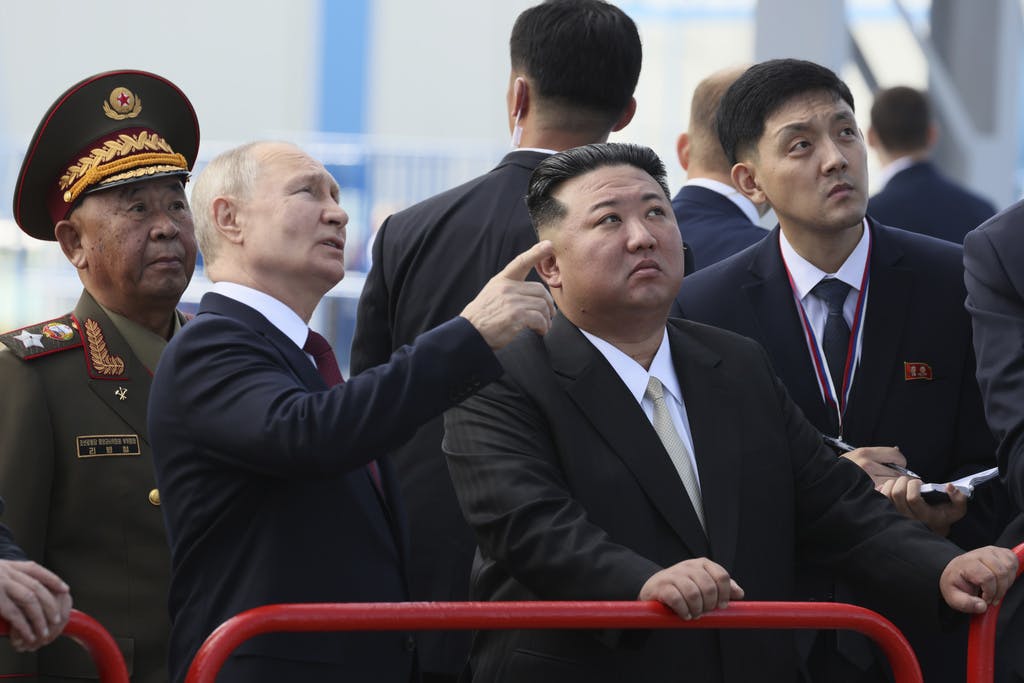Russia, North Korea Firm Up Alliance as Shipments of Munitions Head West To Aid Moscow’s War Effort
Most disturbingly, Chinese and Russian leaders are seeing eye to eye on crisis points far removed from Asia — Israel and Ukraine.

America faces a tightening alliance of its biggest foes in Asia while North Korea’s leader Kim Jong-un speeds up arms shipments to Russia six weeks after shaking hands with President Putin on the deal.
North Korea, sending arms to Russia by rail and sea across the narrow land and maritime border at the mouth of the Tumen River, is now poised to expand on the understanding reached between Messrs. Kim and Putin at the Vostochny Cosmodrome spaceport near the Amur River.
Russia’s foreign minister, Sergei Lavrov, arrives Wednesday at Pyongyang fresh from a gathering of heads of state in Beijing at which President Xi talked up the glories of China’s Belt and Road Initiative linking China by land and sea with dozens of nations from Southeast Asia to the Middle East and Eastern Europe.
Most disturbingly, the Chinese and Russian leaders are seeing eye to eye on crisis points far removed from Asia — Israel and Ukraine.
Tass, the Russian news agency, quoted the Kremlin spokesman, Dimitry Peskov, saying Mr. Putin reportedly planned to talk to Mr. Xi about the war in Gaza after having “already formed a certain opinion about the results of his telephone conversations” with “the parties to the conflict.”
Messrs. Putin and Xi have both put on a show of even-handedness, blaming Israel and Hamas in equal doses of rhetoric while calling for an end to the bloodshed.
They appear, however, to be neutral on the side of Hamas as evidenced by Mr. Putin likening the Israeli blockade on Gaza to the Nazi siege of Leningrad in World War II. That comparison was even more significant since Mr. Putin once served as deputy mayor of St. Petersburg, the historic name to which Leningrad reverted after the fall of communist rule in 1991.
China, conveniently ignoring Hamas’ slaughter and kidnapping of Israelis, has called for a halt to Israeli bombing, which it called “collective punishment of Gaza.” Mr. Putin has condemned the “cruelty” of the Hamas attack on Israel while denouncing plans for entry of Israeli forces into Gaza as “absolutely unacceptable.”
Mr. Putin, however, is undoubtedly much more interested in gaining whole-hearted Chinese support for his war in Ukraine – topic A when they meet Wednesday on the sidelines of the confab marking the tenth anniversary of Belt and Road Initiative.
Putting their heads together, they are sure to come to a friendly understanding while China holds up its longstanding offer to mastermind talks for ending the conflict on terms favorable to Russia.
That was obvious from what Mr. Peskov had to say to Tass. “As a rule,” Tass quoted him as saying, “the [Russian] president gives his assessment of the latest developments in the special military operation.” To which Mr. Peskov added, “Naturally, the Chinese leader also shares [his opinion on the situation].”
Armed with the results of the Belt and Road Initiative meetings, Mr. Lavrov when he gets to Pyongyang will be able to assure Mr. Kim of complete Russian support in the form of long-range deals on arms as well as oil, most of which North Korea gets from China. Russia is also expected to ship food into North Korea while the North faces another long bleak winter.
Mr. Lavrov’s visit builds on the close relationship that Mr. Kim and Mr. Putin sealed during the Korean leader’s six-day tour of the Russian far east last month at which he visited facilities for building planes, ships and other weaponry.
A Georgetown University professor in charge of Korean issues at the Center for Strategic and International Studies in Washington, Victor Cha, said “hundreds” of boxcars have been seen moving across the Tumen River border from North Korea to Russia. “They’re covered by tarps,” he said, but he was certain they contained artillery shells and other munitions much needed by the Russians in Ukraine.
About 1,000 containers have also been seen by satellite eyes in the sky moving from North Korea to Russia across the sea border between the two countries, according to the White House.
Again, while it’s not clear what’s inside, there’s no doubt the revived North Korean-Russian relationship is flourishing as it did before Russia stopped accepting worthless North Korean currency as payment after the fall of the old Soviet Union.
The relationship is so solid that a professor of North Korean studies at Korea University, Balazs Szalontai, sees Mr. Lavrov as getting down to real business at Pyongyang rather than posturing for propaganda purposes.
His visit, Mr. Szalontai told NK News, a website at Seoul, is of “practical rather than symbolic significance.” It’s even hinted that Mr. Putin might drop by Pyongyang later in the week — though Moscow isn’t saying so.

